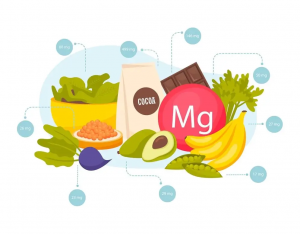Signs of Magnesium Deficiency — And the Best Foods to Restore Your Levels Naturally
Magnesium is an essential mineral involved in over 300 biochemical reactions in the human body.
It supports everything from nerve and muscle function to heart health, bone strength, and immune system performance. It also helps produce DNA, RNA, and the body’s key antioxidant, glutathione.

But despite its importance, many people aren’t getting enough magnesium—and that can lead to serious health issues.
Common Causes of Magnesium Deficiency
Modern lifestyles have contributed to widespread magnesium deficiency. Factors such as:
Overconsumption of processed foods
Alcohol intake
High dairy consumption
Exposure to aluminum
Certain health conditions (e.g., Crohn’s disease, kidney disorders)
Aging
…can all lead to lower magnesium absorption and levels over time.
Signs You Might Be Deficient in Magnesium
Magnesium deficiency can manifest in a variety of ways. If you notice any of the following symptoms, it’s worth discussing with your doctor:
Muscle cramps or twitches
Fatigue and low energy
Irregular heartbeat
Anxiety or depression
High blood pressure
Poor sleep (insomnia)
Dizziness or confusion
Tooth decay
Migraine headaches
Weakened bones
Loss of appetite
Seizures (in extreme cases)
These signs can also overlap with other conditions, so it’s important to consult a healthcare provider for testing and proper diagnosis.
Magnesium-Rich Foods to Include in Your Diet
Fortunately, boosting magnesium levels can often be done naturally through your diet. Focus on whole, unprocessed foods such as:

🥬 Leafy green vegetables — spinach, kale, and Swiss chard
🥜 Nuts & seeds — almonds, cashews, chia seeds, pumpkin seeds
🥣 Whole grains — quinoa, brown rice, whole wheat bread
🥑 Avocados
🐟 Salmon and mackerel
🌱 Legumes — lentils, black beans, edamame
🧈 Tofu and soy-based foods
💡 Tip: Choose whole grains over refined options, and reduce high-dairy intake if necessary.
Also consider switching to aluminum-free cookware and personal care items to reduce exposure.
Should You Take a Magnesium Supplement?
If your magnesium levels remain low despite dietary changes, your doctor may recommend a magnesium supplement.
Always choose high-quality, third-party tested supplements and follow dosage instructions carefully.
Final Thoughts
Magnesium is a powerhouse nutrient that plays a vital role in keeping your body functioning properly.
If you suspect a deficiency, don’t ignore the signs. A combination of dietary changes, lifestyle adjustments, and—if needed—supplementation can make a big difference.
✅ Take care of your health — and don’t forget to share this article with friends and family who might need a reminder too!



























